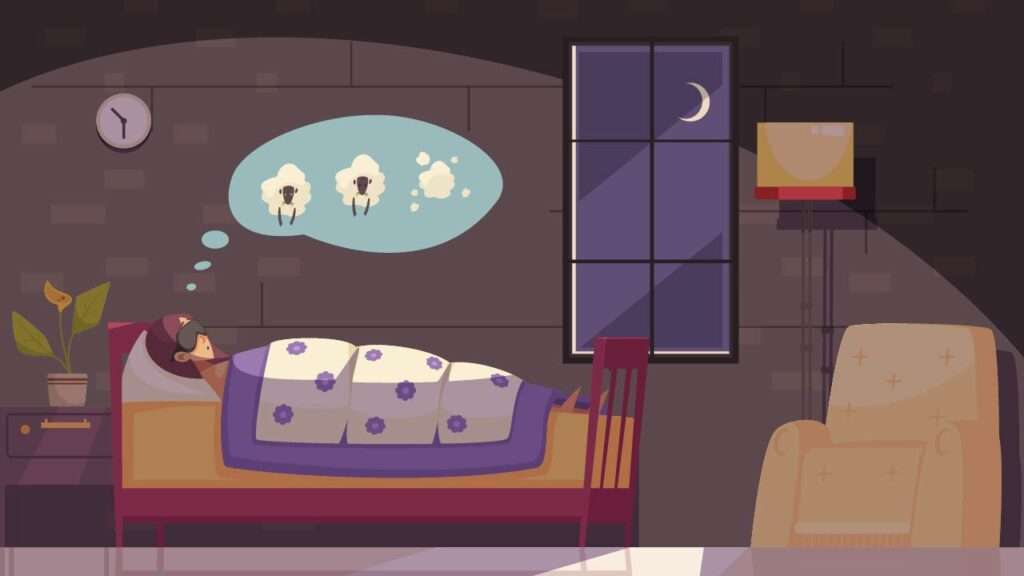Sleepless nights? Here are some simple tips to ensure a good sleep.

Most of you must be reading this in the middle of the night with tired eyes and a brain that’s resisting sleep.
As wise as an owl? Not really.
A 2017 research claims that staying up late at night can take a heavy toll on your physical and mental health.
But how to fall asleep when you can’t?
Well, with the right lifestyle choices and discipline you can easily bring your sleep cycle back on track and fight insomnia.
What is Insomnia and How to Fall Asleep When You Can’t?
Insomnia is a sleep disorder in which a person experiences trouble falling asleep. The difficulty in sleep could come and go or persist for several nights in a row. A person suffering from insomnia finds it hard to sleep throughout the night
We will be covering –
- Symptoms
- Causes
- Natural Cure of Insomnia
How to Know if You Have Insomnia?
There are a lot of symptoms that you can identify that lead to the onset of insomnia.
Primary Insomnia Symptoms Are:
- Difficulty in falling and/or staying asleep
- Waking up frequently at night
- Tired but no sleep
These disturbed sleeping patterns can be difficult to predict. You may fall asleep easily on some nights but stay awake on others. Different people can experience insomnia in different ways. Even the severity of the condition can vary greatly for all individuals.
Primary symptoms of insomnia cause sleep deprivation and lead to the secondary symptoms that are visible on the next day and the following days as –
Secondary Insomnia Symptoms are:
- Waking up still tired
- Sluggishness all day (also due to thyroid problems)
- Unpredictable appetite
- Inability to take to naps
- Irritability
- Decreased Concentration
- Mood Swings
What Causes Insomnia?
Sleep disorders are mostly triggered by an unhealthy daily schedule that causes misalignment of the natural body clock with our day-to-day tasks.
According to our “biological clock”, we are designed to wake up with the sun and sleep as it goes down. Disturbances in this 24-hour cycle decrease the body’s efficiency to control functions like waking and sleeping.
In addition to that, melatonin, a compound that triggers sleep, is affected by the brightness and darkness around us.
Let’s take a closer look at the factors that affect sleep and find answers to how to fall asleep when you can’t.
General Causes of Insomnia are
Insomnia is mostly caused by the wrong lifestyle habits and a disturbed mental state rather than any major underlying factor.
Some causes of insomnia are-
- Stress and anxiety – your brain can’t order you to fall asleep if it feels threatened by a situation. The stressors could be related to career, relationship, trauma, loss of a loved one, self-criticism or an embarrassing incident.
- Uncomfortable environment – an uncomfortable bed, temperature of the room or disturbing noises could be hindering your sound sleep.
- Blue Light Emission – our gadget screens emit blue light which is bad for eyesight. Exposure to too much light or lit scenes can lower the melatonin level and delay sleep.
- Caffeine, alcohol and nicotine – Coffee, tea and carbonated drinks can interfere with your sleep. Alcohol prevents deep sleep and a bad hangover can even spoil your productivity on the following day.
- Insomnia with age – Old people can find it hard to sleep due to their medication or the decreased melatonin levels in old age.
Health Issues that Cause Insomnia are
Sometimes the quality and duration of sleep are affected by health issues and their medications. Some health issues that cause insomnia are –
- PTSD – Post-traumatic stress disorder or PTSD is a condition that disrupts sound sleep by causing traumatic flashbacks. A person with PTSD has a broken non-refreshing sleep.
- Diabetes – Fluctuating blood sugar levels and frequent urge for urination often disturb sleep and can cause irritation and tiredness that can lead to insomnia.
- Thyroid Gland – Hyperthyroidism can cause you to sweat profusely at night and hypothyroidism can cause daytime sluggishness, both of these decrease the quality of sleep at night.
- Depression – Depression can rob you of your life’s joy and sleep. People with clinical depression often lie awake bulking up tension and worry in their heads. They depend on medical aids for good sleep.
Ayurveda’s take on Insomnia
The science of life, Ayurveda, terms the lack of sleep, inability to fall/stay asleep and interrupted sleep as anidra.
The 3 types of body constitution called the Vata, pitta and Kapha influence the quality and quality of sleep. The doshas determine the health and mental state of a person, including sleep.
According to the Ayurvedic texts, sleep is caused by excessive Kapha and insomnia by increased vata or pitta, which may follow physical or mental exertion or disease.
A study on dosha as sleep predictors shows that Vata people are the most likely to be affected by insomnia.
As per the Ayurvedic clock, the 10 p.m. -2 a.m. is the time when the body processes and digests the foods, emotions, thoughts and the body heals itself. A good sleep during this time ensures that these functions are carried out efficiently.
So, by staying up late at night you are interfering with your body’s natural functions.
5 Herbs for Better Sleep at Night
- Ashwagandha – Indian ginseng, ashwagandha, improves the quality of sleep and beats insomnia. It is also a great remedy for pacifying Vata.
- Shankhpushpi – It has soothing properties that relieve mental stress and calm the nervous system.
- Brahmi – Brahmi is considered a great herb for the brain. It improves blood circulation and also improves the body’s healing powers.
- Jatamansi – Jatamansi increases memory power and calms down brain activity which is important for a rejuvenating sleep.
- Tulsi – Tulsi is considered the queen of herbs in Ayurveda. It helps in restoring the natural sleep cycle. Tulsi tea before bed is beneficial in treating insomnia.
A healthy dosha constitution is important for perfect health and sleep. Following a dosha-compatible diet is beneficial in restoring the natural sleep cycle.
10 Tips to Ensure Good Sleep
In addition to a perfect diet, there are some essential things to keep in mind for uninterrupted deep sleep.
- Reduce screen time before bed
- Sleep in a dark or at least a dimly lit room
- Wear comfortable clothes
- Limit daytime naps
- Avoid high sugar level foods at night
- Make and follow a healthy daily routine
- Keep your space clean and organised
- Decrease fluid intake after the evening
- Try mediation to induce sleep
- Avoid watching the news before sleeping
Finally
Sleep hours can vary from person to person according to their dosha constitution. When you are unable to have a refreshing sleep or wake up feeling tired and irritated you need to consider your routine and lifestyle that could be causing these.
Sometimes medication is the only way out of the restless night. In that case, Ayurveda provides a natural and effective treatment for insomnia while also ensuring improved quality of life.
FAQs
The inability to fall asleep can be caused by stress, anxiety, uncomfortable bed, jet lag or a health condition. Working late nights, sipping coffee and energy drinks can lead to reduced sleep. Try eliminating distractions when you’re trying to sleep, for example, phones, overthinking, thinking about the past, etc.
Drinking a glass of hot milk boosts melatonin that helps you fall asleep faster.
Frequent urination is the common reason behind the broken sleep at night. To avoid this try to limit your liquid intake after evening, if necessary take a few sips of water rather than gulping it down.
Using an eye mask can block extra lights at night and will help you sleep better and faster. Doing some relaxing exercises improves blood circulation that results in quality sleep.
Alcohol can interfere with REM sleep. Avoid a platter full of spicy food right before lying down as it may cause acid reflux and abdominal discomfort.
Yoga is a great way to have an energised day and restorative sleep at night. Yoga poses like Savasana and Viprit asana improve blood circulation that helps in stress reduction.
After late-night meals, sitting in Vajrasana pose digests food efficiently and lowers the chances of acid reflux.
Exercises like aerobics, running, and lifting weights help in channelling your body energy and ensure a good rejuvenating sleep at night.
Turning your thoughts off at night can be challenging. At night your body processes all that it has been through during the day, like food, thoughts and emotions. It is also the time your body goes into self-repair mode.
The best technique is to distract yourself by thinking about something that calms you and welcomes sleep.
Try guided meditation, listen to nature sounds or focus on the binaural beats. They can help you relax your nerves as you drift off to sleep.

